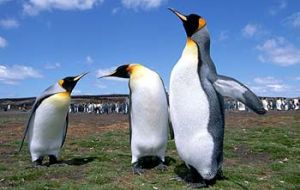MercoPress. South Atlantic News Agency
Wanted: holiday rep to sell joys of Falklands tourism
 More than a million penguins lives in the Islands
More than a million penguins lives in the Islands The only direct flights are chartered by the RAF, and visitors to the beach are asked to keep an eye out for the landmines from the war, 25 years ago. But the Falkland Islands, with their clear skies, 500,000 pairs of penguins and an appealing sense of emptiness, have announced they are launching themselves on the world travel market.
The islands' tourist board is seeking a director to attract more visitors to the archipelago and believes that it can further develop a tourism industry which, from being virtually non-existent 20 years ago, is now the second largest income generator, after fishing. Perhaps anticipating that some prospective directors may be put off by the idea of work on 4,700 square miles of rock in the South Atlantic, the tourist board offers some of Mark Twain's wisdom - "Throw off the bowlines. Sail away from the safe harbour. Catch the trade winds in your sails. Explore. Dream. Discover"- in defence of the lifestyle. The islands' travel industry has been quietly developing without much serious marketing in the past few years. Around 80 cruise ships now arrive each year. These delivered 40,000 people last year, many of them en route to Antarctica before swinging back to the South American mainland. The volume of land-based travel trade is more modest - 1,000 visitors a year. Britons in search of the islands' red telephone boxes and other attractions arrive on one of the RAF's six monthly chartered flights from Brize Norton or else via Santiago, Chile. Fishing holidays, which also take in the waters of South Chile, are also popular. "We are now getting an increasing number of people visiting each year and we are looking for someone to help develop the facilities and deliver some additional marketing expertise," said Sukey Cameron, the Falklands' government's representative in the UK. "We believe the attraction for many people is the solace: the fact that they are going to be in a small group on the islands." The aggressive tourism policy is part of the broad economic development undergone by the islands since 1982. In 1980, the population was sapped by emigration and had dwindled to 1,800. Now, at 2,967, it is well beyond its previous 1930s peak of 2,400, though humans are still greatly outnumbered by 670,000 sheep and more than a million penguins. The discovery, in the late 1980s, that the islands were teeming with seafood, especially two types of squid: illex, a delicacy widely enjoyed in eastern Asia and loligo, served up as calamares in Spain, also helped hugely. But the islands have decided that they must not be too dependent on fishing. For tourism, the 1982 war has created a valuable battlefield niche. Highlights include the camp settlement of Fitzroy; the memorials of Sir Galahad and Sir Tristram which were hit by Argentine missiles nearby; Mount Kent, which became British HQ when it was taken from the Argentinians; and Mount Longdon, scene of the costliest battle for British troops during the night before Argentina surrendered, on 14 June. But a day with the islands' battle interpreters is by no means the only holiday activity, says the government. Penguin tours are already extremely popular. The tour around Bluff Cove (home to more than 2,000 gentoo penguins and a small colony of king penguins) breaks for tea in fine British fashion and also takes in one of the islands' essentials - the Sea Cabbage Cafe. The cafe is housed in a shack on the seashore but its brightly decorated rooms and home-made cookies are legendary. The £45,000-a-year tourism post on offer in the Falkland Islands involves "tackling the challenges of small-scale operations in a remote country and promoting [the islands] in a hugely competitive global market," according to Ms Cameron. By Ian Herbert â€" The Independent - London




Top Comments
Disclaimer & comment rulesCommenting for this story is now closed.
If you have a Facebook account, become a fan and comment on our Facebook Page!